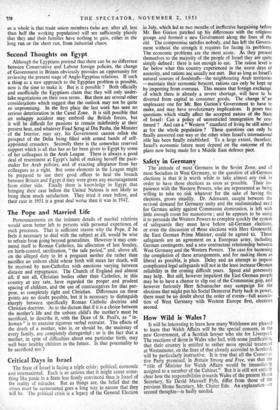Critical Days in Israel
The State of Israel is facing a triple crisis : political, economic and international. Each is so serious that it might cause some- thing like panic in a State less firmly convinced than is Israel of the reality of miracles. But as things are, the belief that the crises must be surmounted goes a long way to ensure that they will be. The political crisis is a legacy of the General Election in July, which led to two months of ineffective bargaining before Mr. Ben Gurion patched up his differences with the religious groups and formed a new Government along the lines of the old. The compromise satisfies nobody, and has left the Govern- ment without the strength it requires for facing its problems. The economic problems are the most acute. As they present themselves to the majority of the people of Israel they are quite simply defined: there is not enough to eat. The ration level is far below what this country experienced in the worst days of austerity, and rations are usually not met. But as long as Israel's natural sources of foodstuffs—the neighbouring Arab territories —maintain their economic boycott, rations can only be kept up by importing from overseas. This means that foreign exchange, of which there is' already a severe shortage, will have to be diverted from capital to consumer goods. The change is' an unpleasant one for Mr. Ben Gurion's Government to have to make, and may have revolutionary implications. It poses two questions which vitally affect the accepted nature of the State of Israel: Can a policy of unrestricted immigration be con- tinued ? Aid can a " Western " standard of living be still aimed at for the whole population ? These questions can only be finally answered. one way or the other when Israel's international role has been finally established. To a large extent, therefore, Israel's economic future must depend on the outcome of the plans now being made for a Middle East defence pad.


































 Previous page
Previous page